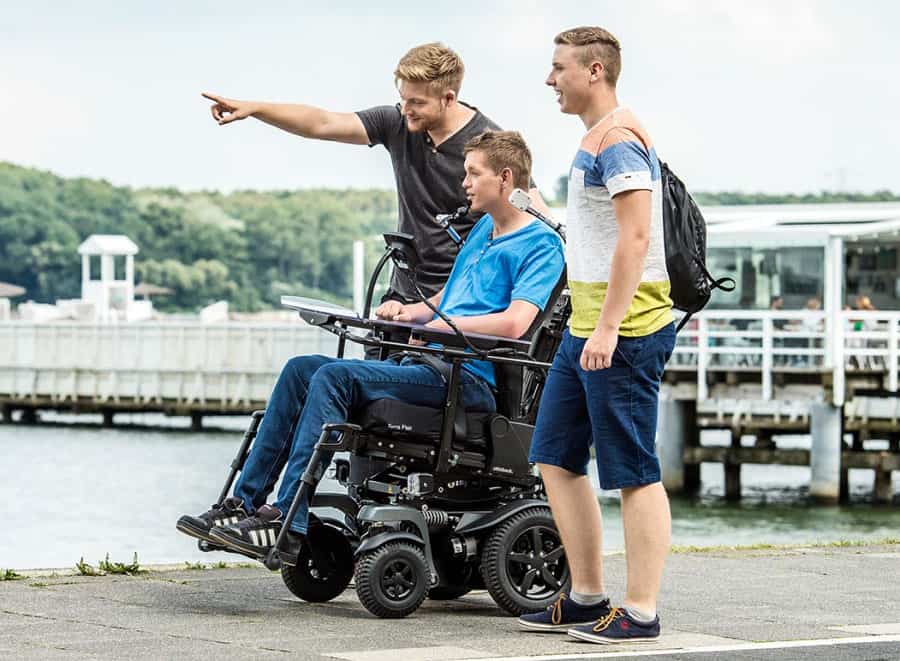Wheelchair growth helps Ottobock exceed one billion in sales but COVID-19 stalls 2020 momentum

In 2019, Ottobock saw its sales grow to over one billion euros for the first time in its 100-year history, aided by double-digit growth in its wheelchair segment, however, coronavirus has disrupted its growth plans for 2020.
The world’s leading prosthetic and orthotic manufacturer saw global sales grow to EUR 1,003 million in 2019, up 8 per cent to the prior year (EUR 927 million).
Citing improved efficiency, the company’s operating profit grew at a proportionately higher than average rate, increasing to EUR 191 million (prior year: EUR 174 million) – another record high for the German manufacturing giant.
In its core orthotics and prosthetics (O&P) segment which also includes its component business and Patient Care, Ottobock’s sales grew organically by 6 per cent to EUR 876 million.
The segment’s performance was buoyed by more patients receiving microprocessor-controlled prostheses and government funding approval in key markets for its C-Brace range.

In the organisation’s Others segment, which includes its Human Mobility wheelchair segment, Ottobock enjoyed a 7 per cent growth to EUR 127 million.
According to Ottobock, its wheelchair operations proved to be one of the fastest-growing categories across the business, achieving double-digit growth thanks “to increased demand for lightweight wheelchairs, wheelchairs for active use, sport wheelchairs and power wheelchairs.”
Despite only making up a small percentage of the company’s overall sales, the company’s emerging ‘Ottobock Industrials’ arm – supplying exoskeletons to employees in production, logistics and manual labour – also enjoyed growth, with the company stating that it offers “tremendous potential for the coming years.”
Across Western Europe, the German supplier saw 6 per cent growth, accounting for approximately half of its billion+ sales, whilst North America and EEMEA (Eastern Europe, Middle East and Africa) grew by 2 and 7 per cent respectively.
Interestingly, Ottobock’s sales in emerging markets saw significant growth, with more than 8 per cent in Asia-Pacific and over 15 per cent Latin America.
A move towards vertical integration
With currently 160 patient care centres in its portfolio, the company invested substantially in 2019 to enhance its Patient Care offer as it moves towards further vertical integration.
In November, the company acquired Belgian O&P specialist Vigo in November 2019, expanding Ottobock’s PatientCare Network and distribution base in Europe with Vigo’s 17 patient care centres in Belgium and 12 in Poland.
“We view ourselves as a vertically integrated solution provider, combining innovative products with patient care in an integrated approach to improve people’s mobility,” explained Philipp Schulte-Noelle, CEO of Ottobock.
“This balance in our business model – as global market leader for prosthetics on the one hand, and maintaining close proximity to our users on the other – is unique in the world of medical technology.”
Ottobock’s investment volume totalled EUR 184 million in 2019, with a total of EUR 100 million ploughed into company acquisitions.
Alongside the Vigo acquisition, Ottobock completed other transactions to strengthen patient care in France, Italy, Sweden and the USA.
“We recognised early on that nurturing close ties to users is a strategic success factor. Not only does it help with orders for prosthetics, but it also means we can take user’s needs into account when we develop or upgrade our products,” added Schulte-Noelle.
2020 outlook and IPO impact
With sales and profitability up in 2019, the company’s CFO Jörg Wahlers commented: “We are pursuing an ambitious plan for the future, and intend to maintain our growth course and improve efficiency over the coming years. High investments form the basis, and prove convincingly that we believe in our potential.”
According to Ottobock, it had originally planned to increase its investment-fuelled growth throughout the 2020 financial year, however, the outbreak of the coronavirus pandemic hit its Patient Care operations hard.
“The coronavirus pandemic severely limited patient care in the key sales markets from March onwards, almost halting it completely at times. The exact impact on the development of sales and results cannot be assessed yet,” stated the company.
Ottobock asserted that once the situation normalises and patient care accelerates again, the expected backlog will have a positive effect as it emerges from the pandemic.
Schulte-Noelle concluded: “Thanks to the robust nature of our business model and the great dedication of our employees, customers and stakeholders – all of whom I would like to thank – I am convinced that we will emerge stronger from this situation. We stand by our 2022 medium-term planning and are preparing for the end of the respective shut-downs around the world.”
In its 2019’s performance and 2020’s outlook statement, however, the company did not mention its intentions to go public.
Since its launch in Berlin in 1919, the O&P market leader has enjoyed substantial global success whilst remaining privately owned, however, it has hinted that an initial public offering may be on the cards over recent years.
Rumblings of an IPO have been growing louder since 2017 when Swedish private equity firm EQT acquired a 20 per cent share in the company and in January 2019, following the permanent appointment of Schulte-Noelle as CEO, the company said he was the right person to lead it to a potential stock market listing.
At the time, Schulte-Noelle was reported saying that an IPO would not take place before 2020.
https://thiis.co.uk/wheelchair-growth-helps-ottobock-exceed-one-billion-in-sales-but-covid-19-stalls-2020-momentum/https://thiis.co.uk/wp-content/uploads/2020/06/ottobock-wheelchair-powerchair-human-mobility.jpghttps://thiis.co.uk/wp-content/uploads/2020/06/ottobock-wheelchair-powerchair-human-mobility-150x150.jpgNewsroomSupplier NewsTrade NewsIn 2019, Ottobock saw its sales grow to over one billion euros for the first time in its 100-year history, aided by double-digit growth in its wheelchair segment, however, coronavirus has disrupted its growth plans for 2020. The world’s leading prosthetic and orthotic manufacturer saw global sales grow to EUR...Calvin BarnettCalvin Barnettcalvin.barnett@bhta.comAuthorTHIIS Magazine

